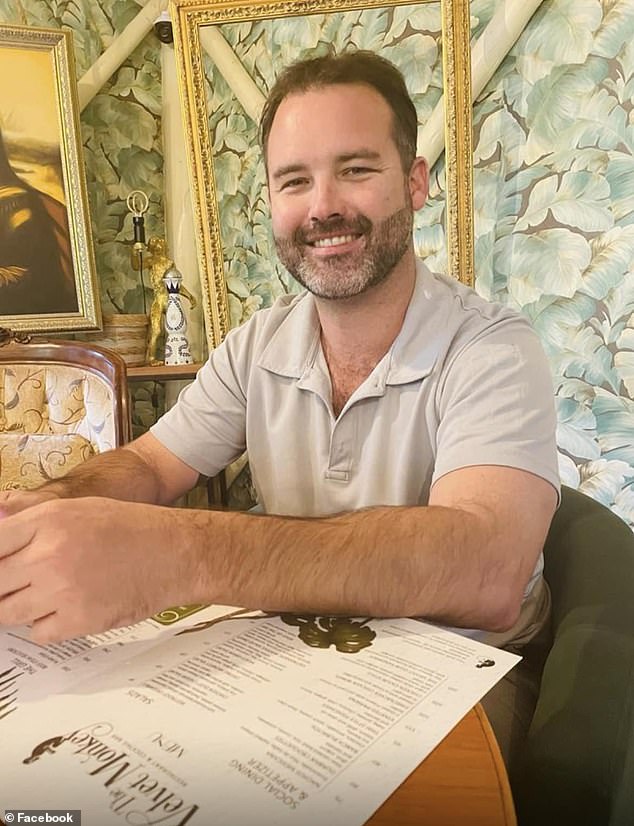An American living in Africa says he was the victim of mistaken identity after online reports linked him to a failed coup attempt in the Democratic Republic of the Congo.
Benjamin Zalman-Polun, 36, was one of three American citizens seen in the West African nation on Sunday before the coup’s apparent leader, Christian Malanga, was shot dead.
As videos of the detained Americans emerged online, social media users quickly began pointing fingers at businessman Cole Patrick Ducey, highlighting his business connections to Malanga and Zalman-Polun.
But Ducey, who currently resides in Eswatini, told ABC News that he was not involved at all in the failed operation allegedly planned by former American refugee Malanga.
“I heard about what happened yesterday on the news, as did you,” he said. ABC News.
Social media users quickly began pointing fingers at businessman Cole Patrick Ducey, highlighting his business connections to the operation’s leader, Christian Malanga.

Marcel Malanga, the American son of Christian Malanga, was detained in the Congo after the failed operation

Benjamin Zalman-Polun, 36, was one of three American citizens seen in the West African nation on Sunday. He, Malanga and Cole at one point created an LLC together
The businessman said he met Zalman-Polun when they were both students at the University of Colorado in 2006.
The two lost contact for years, until Zalman-Polun contacted Ducey in 2020 regarding a mining opportunity in Mozambique and introduced him to Malanga.
The trio traveled to Mozambique in 2022 to review mining concessions and founded a limited liability company.
However. Ducey said they did not continue working together after creating the company.
Ducey said they never discussed the political situation in Congo or Malanga’s desire to be part of the government there. Ducey said he ultimately decided not to do business with the two men.
“We just looked at a couple of mining concessions in Mozambique,” Ducey said of Malanga. “I didn’t know him very well, but from what I gathered he wasn’t very smart.”
He said he had no contact with Malanga and Zalman-Polun in about two years and was shocked to read about their alleged involvement in a violent coup attempt.

Social media users mistakenly identified the man on the right as Ducey. The real identity of the man in the photo remains unconfirmed.

Ducey said they never discussed the political situation in Congo or Malanga’s desire to be part of the government there.
“I had nothing to do with this and I was not involved in any way,” said Ducey, who was in Eswatini on Monday, referring to Congolese media reports naming him among the attackers.
The alleged coup attempt began at the Kinshasa residence of Vital Kamerhe, a federal legislator and candidate for president of the Congo’s National Assembly. His guards killed the attackers, authorities said.
Congo’s army spokesman on Tuesday released the name of the third American involved in the foiled coup, as relatives in Utah gathered to mourn Malanga.
Brig. Gen. Sylvain Ekenge told The Associated Press that the third American was Taylor Thomson. It was not immediately clear whether Thomson was among those arrested or killed on Sunday morning following the attack on the palace and another on the residence of a close ally of President Felix Tshisekedi.

Marcel Malanga, 21, looked terrified as he was framed before the attempted coup in a video posted on Facebook by his father.
Malanga, described by Ekenge as a naturalized American, was killed in a shootout at the palace after resisting arrest. The State Department said it could not confirm that Malanga was a U.S. citizen.
The other two Americans involved were Zalman-Polun, a married father of three, and Marcel, Malanga’s 21-year-old son.
Authorities were still trying to unravel how the young man went from playing high school football in Utah to allegedly trying to overthrow the leader of one of Africa’s largest countries.
“My son is innocent,” his mother, Brittney Sawyer, wrote in an email to The Associated Press on Monday, declining to give further details.

In a Facebook post early Monday, Sawyer angrily wrote that her son had followed his father. ‘This was an innocent child who followed his father. I’m so tired of all the videos being posted everywhere and sent to me. God will take care of you!’
A video that circulated on social media over the weekend showed his son next to a bloodied white man, whose identity was unclear, both covered in dust and surrounded by Congolese soldiers. Marcel has his hands raised and a scared expression on his face.
Dino Mahtani, who worked in Congo for years as a journalist and then a U.N. political adviser between 2015 and 2018, told the AP that Malanga had likely been deceived or betrayed.
“It’s really hard to imagine how 20 or 30 guys thought that by storming the presidential palace when no one was there at 4 in the morning they could somehow take over the Congolese state,” he said.
“They could be external conspirators, but given their previous close relationship with at least one of Tshiskedi’s current military commanders, there is some possibility that the plot was known internally.”


